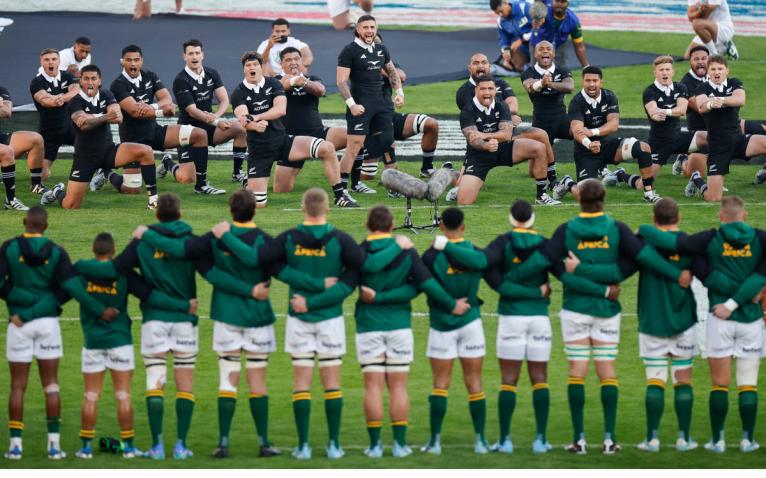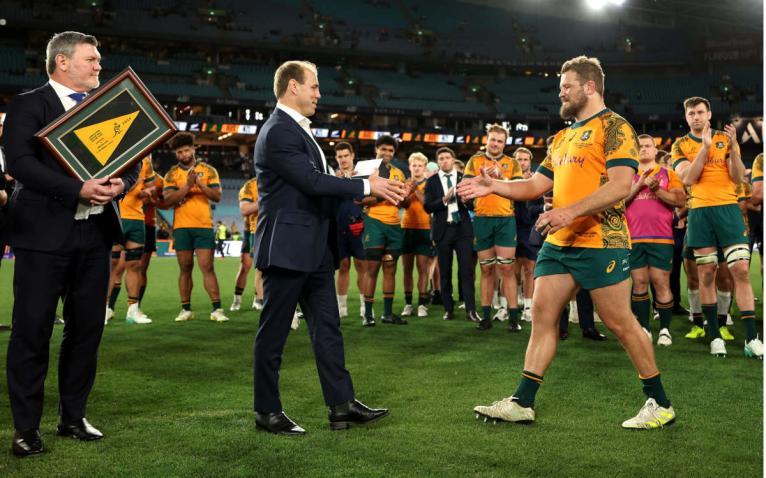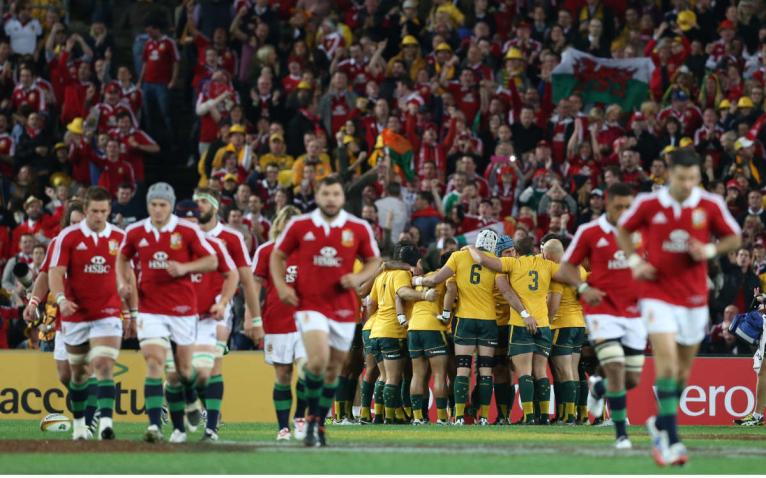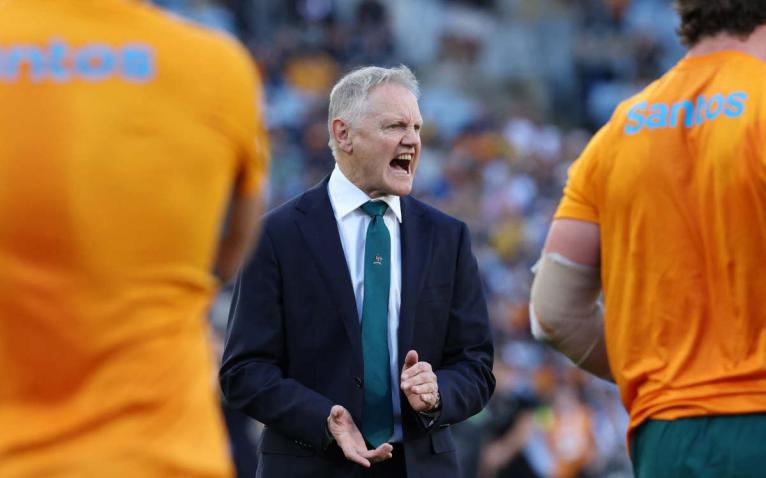The rugby world is worried about Australia – starting with their ability produce quality Super Rugby teams and by extension, a competitive Wallabies team to play the British and Irish Lions next year.
There are concerns about their ability to keep their public engaged in the 2027 World Cup such are the troubles the Wallabies are having in winning Tests and passing themselves off as a credible rugby force.
There are concerns, too, about Rugby Australia’s financial viability given it is having to make punitive interest payments on an $80m loan facility it set up with an Australasian fund manager.
The possibility of a prolonged and potentially expensive legal battle also now looms with the directors of the Melbourne Rebels who have lodged court proceedings against Rugby Australia, suing the national body for $30m of damages.
RA has counter-sued, saying the club – which has gone into administration and is no longer part of Super Rugby – hid its true financial position. If nothing else, a PR toe-curler looms.
And all these worries have been deepened by the confirmation that New Zealand and South Africa are going to tour each other’s countries every four years in an agreement that leaves considerable doubt about the viability of the Rugby Championship and just who exactly the Wallabies are going to be playing between 2026 and 2030.

These are not baseless fears. Australia has suffered a dramatic fall from grace since the heady days of winning two World Cups in the 1990s and making the final of the 2003 tournament which they so brilliantly hosted.
The statistics when they are laid bare, make grim reading. Australia hasn’t had a Super Rugby champion since 2014. They haven’t won the Rugby Championship in a ‘normal’ year – their only success coming in the truncated 2015 tournament.
They haven’t held the Bledisloe Cup since 2003 or beaten the All Blacks in New Zealand since 2001.
What’s most worrying for Australian rugby fans, though, is that their decline has been faster and more intense since 2020.
They have managed just one victory against the All Blacks in 12 Tests since 2020, they failed to get out of their pool at the 2023 World Cup and they now sit a record low ranking of 10th, having fallen to a record 67-20 defeat to Argentina during The Rugby Championship.
It looks gloomy and uncertain, but perhaps the nadir has been reached and perhaps a recovery is not as far away as it seems.
Whether it’s a symptom or a cause of this rapid recent decline, Rugby Australia also saw broadcast income drop from around $54m a year in 2020 to $29m a year in 2021 when it became clear broadcasters were not queuing up to buy rugby rights.
And with less money coming in, Australia entered a vicious debt cycle in 2021, having to borrow $80m at interest rates believed to be in excess of 10 per cent, which meant there was no ability to save the Melbourne Rebels earlier this year.
It looks gloomy and uncertain, but perhaps the nadir has been reached and perhaps a recovery is not as far away as it seems.
Rugby Australia chief executive Phil Waugh certainly doesn’t think all is lost, not when the forecast is that the Lions tour and two World Cups will net RA around $225m in profit.
That’s enough cash to get out of debt, and arguably, losing the Rebels gives RA a more sustainable cost base to maintain, and a better chance of staying out of debt.

“We have got a debt profile that we are managing and we need to pay that debt back,” Waugh says.
“Then we need to go into a new broadcast cycle and we need to have a sustainable game so the money we make there, we can invest into a legacy fund that we can invest back into the community game.
“You can’t keep living on future revenues. You have got to get to a sustainable model.
“The economics of the game are not sustainable as they were. It’s a combination of how do you maximise your commercial revenue and get to a cost base that matches your revenue?
“We have all been living beyond our means and trying to stay with player inflation and obviously the leagues across the world are feeling it.”
Australia’s stroke of luck or good management, depending on who you believe – is that they rejected/were rejected from doing a private equity deal a couple of years ago, which means they have not sold a share of their revenue to a third party in perpetuity the way New Zealand Rugby has.
What Australia earns Australia will keep and this may prove significant over the long term as doubts start to grow about whether the private equity sales in Europe, New Zealand and South Africa were the right moves.
Right now, we are very comfortable with the path that we are on. My focus is on setting the game up in perpetuity and the longevity of the game, not on short term commercial sugar hits.
Phil Waugh, ARU Chief Executive
“We explored it,” Waugh says of doing a private equity deal. “But given what we had coming down the pipeline, given the equity markets and the multiple at the time on the enterprise value, we decided to go down the debt path.
“Right now, we are very comfortable with the path that we are on. My focus is on setting the game up in perpetuity and the longevity of the game, not on short term commercial sugar hits.”
The question, however, will be how much, excluding the showpiece events, can Australia harvest in the coming years? Can they up their broadcast deal from its current, unsustainable figure of $29m a year (supplemented by $8m from NZR as part of a Super Rugby revenue sharing agreement)? And will improved balance sheet lead to an improvement on the high-performance front?
So much will depend on three things. Firstly, the future shape and geographic footprint of Super Rugby will be critical.
RA needs to be selling broadcasters a competition that is compelling and viable, which means a long-term solution needs to be found to the current problem of having only 11 teams.

Waugh also says that the onus is on Australia to improve its performance to engage fans and to reconnect the Super Rugby clubs with the grassroots.
“The platform is burning right because 11 teams does not work and I think everyone recognises that.
“We are playing over a longer period and playing less games in 2025. You just need to go through the history of Super Rugby and the different iterations and you understand why the relevance has been lost somewhat.
“I think one of our biggest challenges, is for the last 15 years we have drifted further apart from the community game, to the club game to the professional game.
“We used to have the community and clubs come and watch their players play for the Super Rugby team and we need that fully integrated model where the clubs are proud of their players because they are playing for the Super Rugby team.”
Secondly, broadcasters are going to need confidence in the international schedule the Wallabies will be able to put together in the next cycle given there will be no Rugby Championship in 2026 and 2030.
Again, though, the news is better on that front than has been reported. An agreement has been reached with NZR to play at least two Beldisloe Cup tests in those years, and possibly a third if a viable way to play an Anzac test in mid-April during Super Rugby can be signed off.
Waugh is confident that with four viable Super Rugby teams, and Joe Schmidt installed as Wallabies head coach, that performance will improve significantly in the coming years.
In addition, South Africa have agreed they will send a full-strength Springboks team to Australia in 2026 and 2030, with Waugh saying that other fixtures with Argentina, Japan and Fiji will be agreed.
The Australians, despite their lack of success, still love the Bledisloe with 70,000 turning up to watch the first encounter in Sydney this year and it remains a highly marketable and valuable property.
Likewise, a one-off Test against the Boks will be easier to promote than a Rugby Championship two-Test series, for the simple reason the Wallabies will have a higher probability of winning a single game than going back-to-back against the world champions.
Which builds into the third thing RA must sell to prospective buyers of the broadcast rights – a winning Wallabies team.
That’s the hardest thing of all to believe in given their only victories in the last two years have come against Georgia, Portugal, Wales and Argentina. Their record is six wins from 18 Tests and that doesn’t bode well to entice broadcasters into writing a big cheque.
But Waugh is confident that with four viable Super Rugby teams, and Joe Schmidt installed as Wallabies head coach, that performance will improve significantly in the coming years.

Schmidt is certainly a proven talent, and there have been signs of his influence having had an impact with the Wallabies winning in Argentina and then pushing the All Blacks as close as they did in Sydney, before producing arguably – despite the 33-13 scoreline – their strongest, most innovative and compelling performance of the year in Wellington.
There were supremely good passages of pick and drive by the forwards; the scrum held up; the exit plays of going wide-wide inside their own 22 broke the All Blacks plenty of times and it was clear to anyone who understands the game, that the Wallabies are a side on the improve and one with huge potential now that Schmidt is coaching them.
There’s a long way to go, but Harry Wilson is growing into a quality No 8, Fraser McReight is up there with the best sevens in the world, Noah Lolesio is maturing at No 10, Hunter Paisami is becoming a world class No 12 and Andrew Kellaway and Tom Wright would add value to any back three.
Waugh says: “We know we are not holding up our end of the bargain on performance but we are doing everything we can to fix that.
“We have got a big country with a big population and a big GDP. We breed good athletes we just have to make they want to play rugby, and we have got the right structures around them and that we are setting the system up for success.
“There is a lot to like about Australia. It becomes very lonely if we are not competitive for rugby in New Zealand.”


Those first 10-15 pars were tough reading but it’s unfortunately all true.
Fingers crossed.
10/12 is our biggest concern now. Not sure how that gets solved in the near term
I think that the way to get Australia back on track is to allow offshore players to be selected for the national team. That will lead to an exodus of domestic talent. So, to promote strong competition for upcoming talent they should also recruit quality players from overseas to supplement the super rugby teams. Of course this would mean that they would have to pick less established players from overseas, but there are plenty of foreign players who would relish the opportunity to play for a super rugby team. Recruit them young and hungry. Build competition for the local pool and if the opportunity arises and they are eligible, select them for the national team. Just about all the other top international teams do the same thing (South Africa and Argentina excepted). Exploit the global pool of talent…
Surely they have to come from New Zealand. That's the whole debate/battle/dilemma in a nutshell. Everything is currently a vehicle for New Zealand and Australia's national sides. I think you have to ditch the idea that you can push the case that the national side is going to be better off with a lower quality domestic competition (and so solely select from overseas like Argentina), and jump on the idea Super should a rugby product first and foremost, and that the sides should recruit quality players from overseas instead of putting investment into a wider bunch of lower quality nationally eligible players.
Going that direction could have knock on effects of raising the current standard of Super, increasing interest, making it more marketable, resulting in star players wanting to stay, and then finally, possibly, even making Australia more successful (if with less depth). The comp and teams will no longer be 'for Australians', they will simply be like most other privately owned clubs. If that became successful then investment can be put into that bunch of players underneath who have been missing out, and therefor raise more Super quality locals as a result in time (taking the squads back to being largely Australian players).
Because I agree, there is plenty of talent out there. NZ would be the first place to attempt this, even paying them back that 8 or 9 million loan they got from them might be enough compensation to allow NZR to release their players to Aussie SR sides (individuals still paid by NZR). When there's only 4 teams, just a small number of quality signings will make a big difference, then see how success the sport is locally once they're winning the majority of their home games.
Unfortunately, it's obvious that rugby union is effectively dead in Oz. The competition of Aussie Rules (top) and Rugby League (second) is just too much for them, to the extent that they seem to be attempting to change union into league - witness the Perth Bok test when there had to be uncontested scrums, just like the ridiculous ones in league - even to the idea of getting Brett Robinson as the next WR chairman so he would be in a position to facilitate that stupid conversion.
I don't see it that way in your country from the outside. They are no longer in aussie rules heartland, and they only have State level teams to fund in Leagues heartlands. Othewise they can lock down easily (even State level rugby out performes club level league though) the WA and ACT markets imo.
Can't see Perth as being interested in what happened there Steve.
You reap what you sow. SA couldn’t care less about Australia. Contrary to popular belief the world doesn’t need a strong Australia, it doesn’t need Australia at all. A BIL series win couldn’t be more important..
How is SA's view relevant DP? What's brought that on! Don't you like having a dominant league like the Top 14 on your doorstep?
There's a saying here, "if a kiwi decides to go earn a living in australia, it raises the IQ of both countries!", the same could also be said of SAn teams raising the standards of both SR and the URC when they ditched it. Be careful what you sow.
Please explain.
What has Australia sown?
Rugby does need more strong teams. Not less. The minnows were woeful at the 2023 World Cup. Australian rugby is in a bad state. Hopefully it can shine again.
Australia has the world cup and a Lions tour to look forward to. Those will be big revenue spinners. I was disappointed to see that NZ and SA have abandoned the Rugby Championship in those years but TRC is becoming less viable and is not a cash grab for the south like the 6N is for the North. AUS needs SA and NZ and it seems like they are committed to assisting them with fixtures in 2026 and 2030. Best decision was to cut the Rebels even if it was painful. As long as they can get their financials right then they can invest in players and the game. Unfortunately I dont see broadcasters coming with a big deal for the team right now. That will be a big problem. Super Rugby is dying, is becoming less relevant, keeps losing its star attractions to northern clubs and Japan and needs to do something drastic. Surely they need to introduce some kind of IPL like draft system that will change everything. Allow private ownership of franchises and have players from all over the world sign up for a Super Rugby auction.
Would imagine TRC is still a 'cash grab' for SA and NZ, especially with the success of those two western hemisphere countries. Bledisloe I think holds it's value on it's own still in NZ, I'd imagine no TRC (it hasn't been confirmed yet right) would hinder the value of a SA visit though.
Best I think to just extend the current deal with Stan until the future has a more solid outlook, would be a shame to come out with a great rugby concept in a few years and but stuck into a longterm broadcast deal where it's impossible for a broadcaster to know the value. Wasted money (I'm confident things will continue improving).
So not now, but you'd hope double soon enough, a broadcaster is not going to see as much value in RWC hosting rights if it has not earned the rugby viewers confidence (so the next three years rights gain that important/value/confidence growing opportunity to sell big advertising rights come 2027 etc. I'm sure SR is actually still on the up in aus, I saw a graphic a few years ago now showing the decline in players going overseas, I wouldn't say i've noticed it being different in aus. Would be interesting to see a more updated report showing 23's cycle.
Hard to really see that concept working if it hasn't already, but I like the idea. I thought the Force would have welcome spending big money on some stars with Twiggy's backing (which I though he would provide if asked) but they appear to have gone State focused like the rest. Could they be persuaded to look overseas, along with ACT, to up the anty? Imagine two high profile clubs like them paired with the two massive State focused teams in QL and NSW battling it out with NZs stacked sides?
Super rugby ceased to exist four years when the idiots at NZRU decided to screw SA and are now experiencing the results of their stupidity. SA is now quite rightly N-S for club rugby at least, and hopefully for the international side too. The Antipodes will just have to be happy with tours now and then. Finish and klaar.
I think you and Phil are smoking it mate. The blueprint has been written by SA. If Aus aligns itself with the northern hemisphere timetable and forges good relationships with OS clubs and has players do stints there they can receive better coaching and get some pay from the OS clubs leaving funding for the local comp and the wallabies can get back to winning by selecting OS players.
- Sio and Ainsley propping
- Skelton, Arnold and Philip together with Amatesero in Aus
- Kerevi and Hodge in the backline
- Samu for the back row
- Latu at hooker for jackling
Team looks much better with them playing and would not have lost players like Meafou to Toulouse and France.
Paisami is woeful at 12. Poor defence and low skill player. Noah is an average player at best. McReight would be good if Aus had better jackling options but he is not powerful enough at the breakdown at international level.
Being flexible may be the best outcome, but SA have been enjoying their players returning, so the 'blueprint' is much more about make the current setup succeed that what you suggest.
I think at least if players like Paisami, Noah, McReight can go overseas (your idea), you will at least be able to make a more accurate opinion on their level relative to those also currently being os!
"Noah Lolesio is maturing at No 10, Hunter Paisami is becoming a world class No 12"
Does this fellow know anything about rugby. NL and HP would not get a run in any decent side. They are only there on sufferance.
He was apparently a very good starting Top 14 10 when he was there at the start of the year.
Look, I’m not convinced by NL myself… I’m a little surprised that Australia hasn’t got someone better… I mean, it wouldn’t be hard to get a decent rugby league half to adapt to Union…
Bringing home a Grand Slam would solve a few problems.
In Joe We Trust.
They’ve at least got one of the best coaches in the world to turn it around.
A kiwi, talking up a kiwi coaching Australia, to keep them down.
Which is dragging the All Blacks down too .....
I wonder how long it will take NZ to wake up to the fact that that sabotaging Australia with it's coaches is actuallly working against it's own interests ?
NZ is not being tested against Australian rugby minds and innovation, it's just kiwis against kiwis and therefore unsurprisingly, quite dull.
It doesn't really count when Australia has a kiwi coach.
Gregor is a Scot. His wife is a kiwi.
Yet another smoke sesh for you aye John?
Let Them Rot
Absolutely. Now, answer me a much more important question: who's going to win the Stormers - Munster game on Saturday?